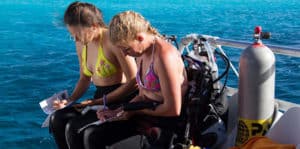As scuba divers we are always taught to dive with “buddies” but what exactly is a buddy? What makes you a good or a bad one?
If now married to a scuba diver, but for 99% of my diving career I have usually been flying solo on dive trip and boats, getting the buddy I was assigned. While most of my buddies have been great, carrying out thorough buddy checks, staying close by and sticking to the dive plan. There have been a lot of buddies who appear to have no interest in anything other than themselves, have had no idea where I was or even if was there for the past hour – actually I’m surprised some even managed to follow the dive guide and return to the boat.
How to be a better buddy?
Here at Dive station Pattaya we have put out heads to to come up with some pointer to guide to be the best buddy possible:
1.The buddy system is for everyone
The buddy system is not just for beginners, it is important for the safety of all divers in a group. Ensure that you have established who is buddying up with who before the dive and discussed the plan (at Dive Station Pattaya this will be established with your PADI Pro at the dive briefing). Introduce yourself to your new buddy, ensure that you are both in agreement and comfortable with the dive plan.
2.Always remember your buddy check
Just because your equipment worked fine yesterday or this morning doesn’t mean that you haven’t missed something this time. Most issues that arise underwater could and should have been identified at the buddy check. You know your own kit but does your new buddy? And visa versa. You might be using hired gear, the buddy check will help you familiarise yourself with it by going through key features. Use the BWRAF acronym to help remember the buddy check steps. I teach my students “Burger with relish and fries” there are plenty of others but I’ll let you figure them out yourself…
3. Always stay close to your buddy and communicate often
You don’t have to hold hands but as a general rule of thumb, try to be no more than 2 seconds apart. This not only helps your PADI Pro to monitor the group but will also allow you to deal with any emergencies as quickly as possible. Ask your buddy if they are ‘ok’ periodically throughout the dive and be aware of your buddies air usage as well as your own. These simple steps ensure mornor issues are communicated early before they escalate into big problems
4. Remember that you are a buddy “team”
Never force your buddy into a dive that they don’t want to make. If you or your buddy are unsure about anything, seek advice from your PADI Pro. Remember, no dive is more important than your or your buddies safety. You should never carry out a dive that you are uncomfortable with or is outside your training limits. Tec-Divers have rule that: “Any diver can end the dive at any time, for any reason, without fear of repercussion.” You would well advised to take this rule on board. Don’t make anyone feel bad for calling a dive that they were uncomfortable with.
5 . Plan the dive and dive the plan
Make sure that the dive plan is in place and agreed before starting the dive. Evaluate the conditions and ensure that the dive is within the training and experience of all divers. Here at Dive Station Pattaya, your SSI Instructor will run through the dive plan with you at dive briefing and although he is controlling the dive you and your designated buddy should be diving the plan too.
6. Dive, dive and dive again
Come out with us on our regular trip we off a range of fun diving packages, as we always say with diving practice makes perfect. If you aren’t lucky enough to live here in Pattaya all year round explore the dive centres close to home, even if you don’t fancy diving in cold water many will hold regukar pool session in pools. I know in my home town I can go diving every Thursday in 5 metre pool to keep my skills sharp
7. Improve your Knowledge and Experience
If you have just completed your SSI Open Water Diver Course speak with Danny in the shop about booking on to the Advanced Adventurer programme. You’ll learn a lot of new skills and try different types of diving.
Consider the SSI Diver Stress & Rescue Course you will be equipped with the knowledge and practical skills to perform self-rescues, rescue other divers and recognise potential problems before they develop. You will hear divers of all levels say that their Diver Stress & Rescue course was one of the best that they have ever taken. If you’ve already taken SSI Diver Stress and rescue, look at the specialities
We at Dive Station Pattaya believe that continuing your diver education is inseparable from being a better buddy , so call in for a coffee and chat through how you want your diver education to develop.



